Travel and Tourism: Legislation, Ethics, and Business Practices Report
VerifiedAdded on 2020/12/29
|10
|2636
|120
Report
AI Summary
This report comprehensively examines the legal and ethical dimensions of the travel and tourism sector. It begins by evaluating the legal and regulatory frameworks, including surface, sea, and air transport laws. The report analyzes the impact of health, safety, and security legislation, using TUI group as a case study, and explores equality legislation with reference to UK tour operators and travel agencies. It then delves into contract and consumer protection legislation within the context of travel and tourism, highlighting the legal responsibilities of businesses like Brightsun Travel. Furthermore, the report assesses ethical dilemmas faced by the sector, focusing on issues such as leakage of income, green ethics, false advertisements, and employment ethics. The CSR policies of Thomas Cook are analyzed, including aspects of sustainability, accountability, and business conduct. The report concludes by emphasizing the crucial role of legislation and ethics in managing tourism-related business operations.
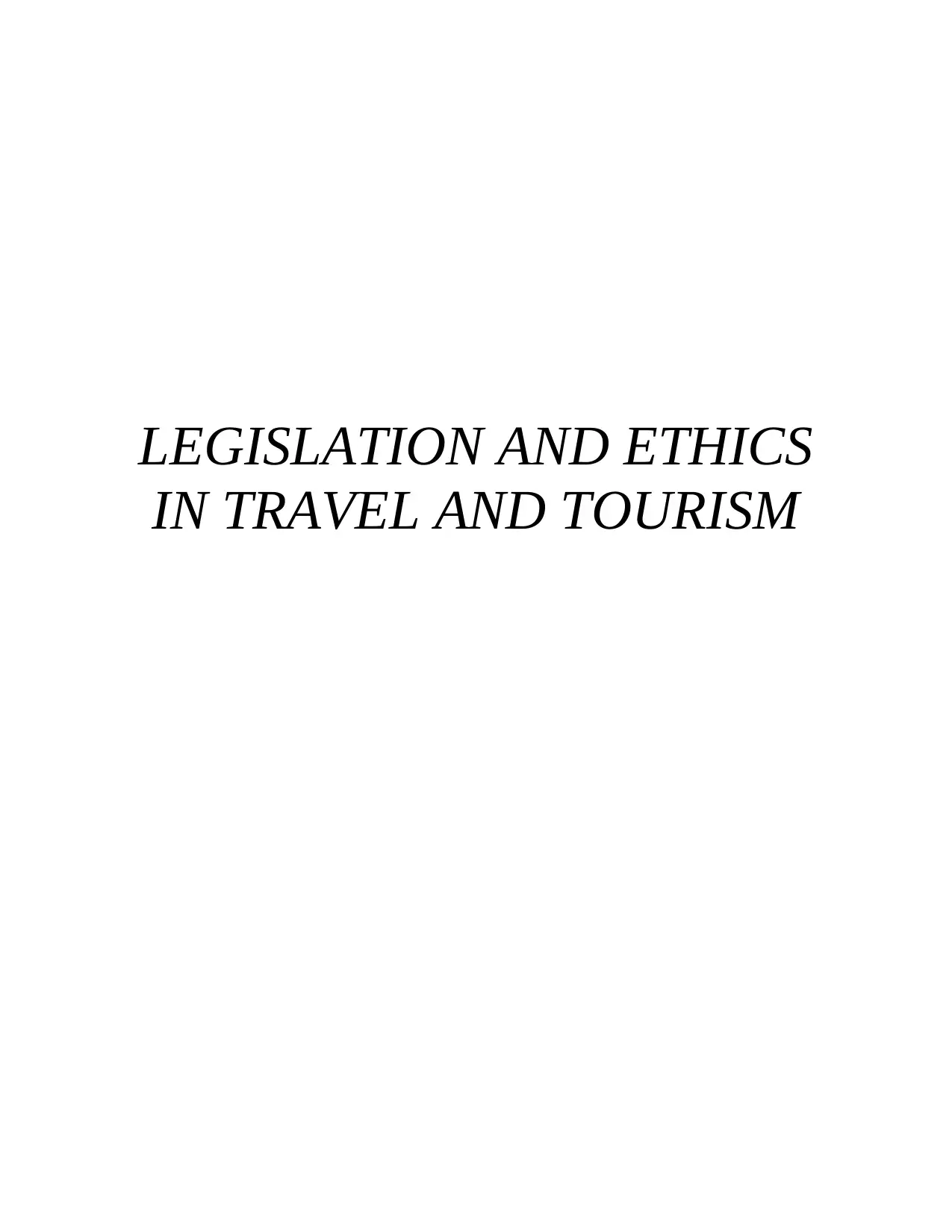
LEGISLATION AND ETHICS
IN TRAVEL AND TOURISM
IN TRAVEL AND TOURISM
Paraphrase This Document
Need a fresh take? Get an instant paraphrase of this document with our AI Paraphraser
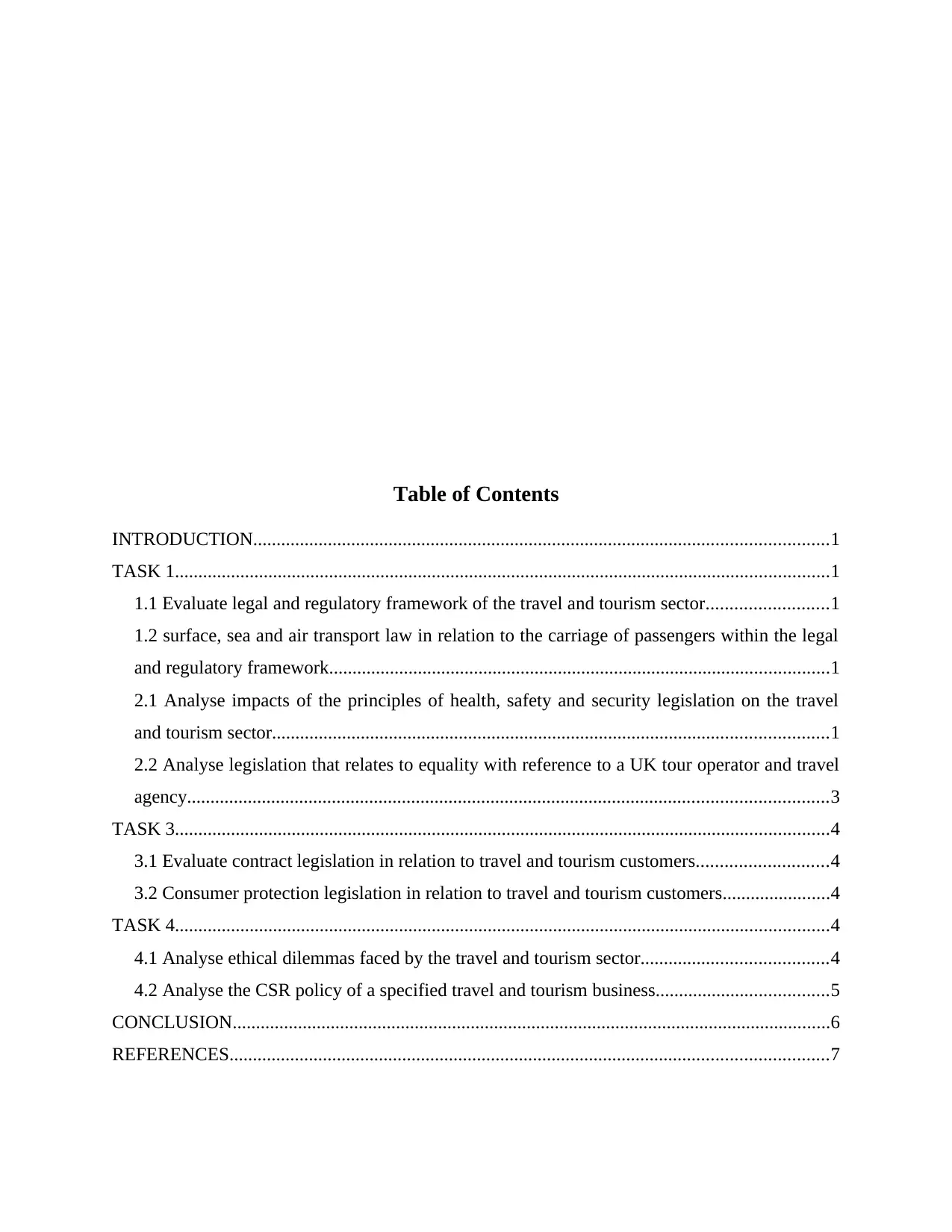
Table of Contents
INTRODUCTION...........................................................................................................................1
TASK 1............................................................................................................................................1
1.1 Evaluate legal and regulatory framework of the travel and tourism sector..........................1
1.2 surface, sea and air transport law in relation to the carriage of passengers within the legal
and regulatory framework...........................................................................................................1
2.1 Analyse impacts of the principles of health, safety and security legislation on the travel
and tourism sector.......................................................................................................................1
2.2 Analyse legislation that relates to equality with reference to a UK tour operator and travel
agency.........................................................................................................................................3
TASK 3............................................................................................................................................4
3.1 Evaluate contract legislation in relation to travel and tourism customers............................4
3.2 Consumer protection legislation in relation to travel and tourism customers.......................4
TASK 4............................................................................................................................................4
4.1 Analyse ethical dilemmas faced by the travel and tourism sector........................................4
4.2 Analyse the CSR policy of a specified travel and tourism business.....................................5
CONCLUSION................................................................................................................................6
REFERENCES................................................................................................................................7
INTRODUCTION...........................................................................................................................1
TASK 1............................................................................................................................................1
1.1 Evaluate legal and regulatory framework of the travel and tourism sector..........................1
1.2 surface, sea and air transport law in relation to the carriage of passengers within the legal
and regulatory framework...........................................................................................................1
2.1 Analyse impacts of the principles of health, safety and security legislation on the travel
and tourism sector.......................................................................................................................1
2.2 Analyse legislation that relates to equality with reference to a UK tour operator and travel
agency.........................................................................................................................................3
TASK 3............................................................................................................................................4
3.1 Evaluate contract legislation in relation to travel and tourism customers............................4
3.2 Consumer protection legislation in relation to travel and tourism customers.......................4
TASK 4............................................................................................................................................4
4.1 Analyse ethical dilemmas faced by the travel and tourism sector........................................4
4.2 Analyse the CSR policy of a specified travel and tourism business.....................................5
CONCLUSION................................................................................................................................6
REFERENCES................................................................................................................................7

⊘ This is a preview!⊘
Do you want full access?
Subscribe today to unlock all pages.

Trusted by 1+ million students worldwide
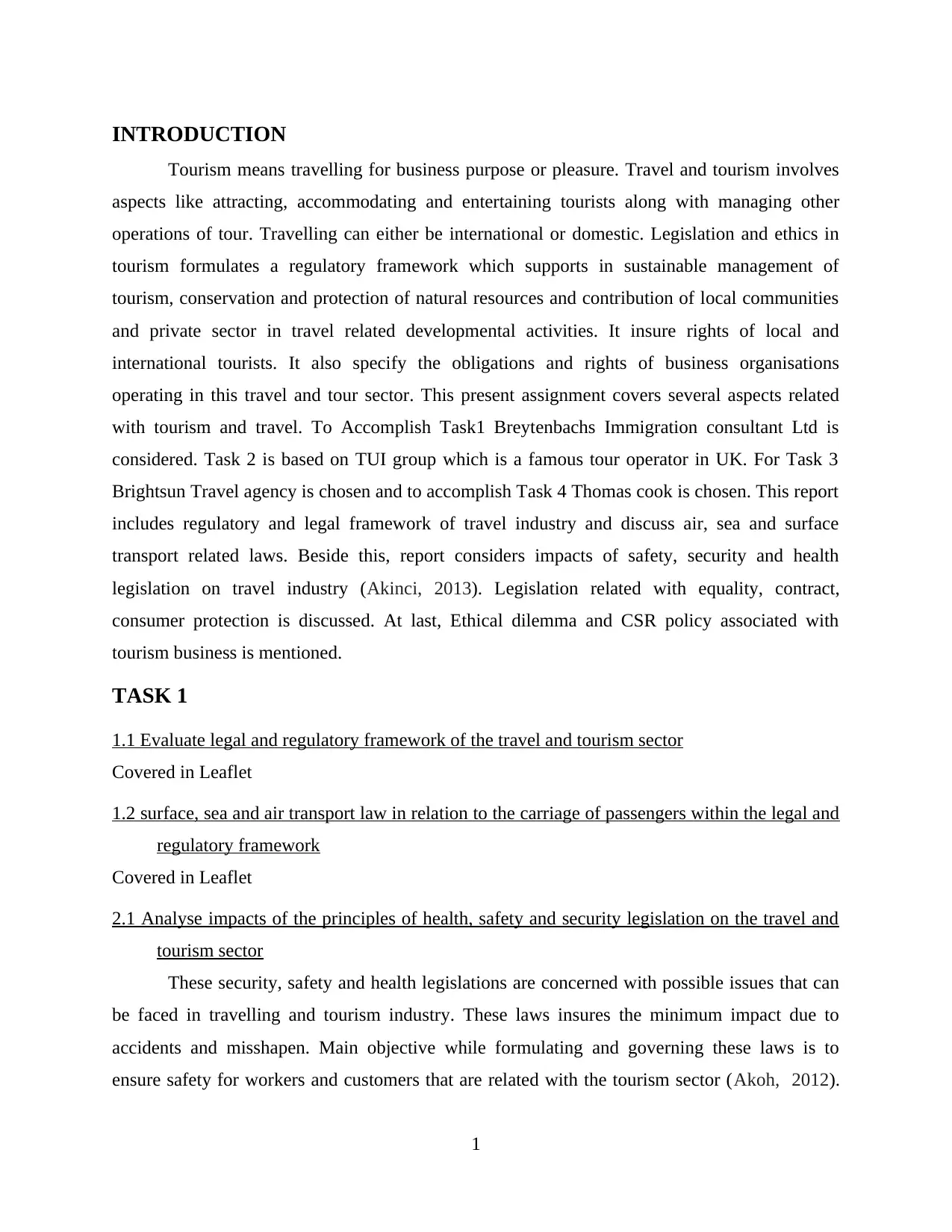
INTRODUCTION
Tourism means travelling for business purpose or pleasure. Travel and tourism involves
aspects like attracting, accommodating and entertaining tourists along with managing other
operations of tour. Travelling can either be international or domestic. Legislation and ethics in
tourism formulates a regulatory framework which supports in sustainable management of
tourism, conservation and protection of natural resources and contribution of local communities
and private sector in travel related developmental activities. It insure rights of local and
international tourists. It also specify the obligations and rights of business organisations
operating in this travel and tour sector. This present assignment covers several aspects related
with tourism and travel. To Accomplish Task1 Breytenbachs Immigration consultant Ltd is
considered. Task 2 is based on TUI group which is a famous tour operator in UK. For Task 3
Brightsun Travel agency is chosen and to accomplish Task 4 Thomas cook is chosen. This report
includes regulatory and legal framework of travel industry and discuss air, sea and surface
transport related laws. Beside this, report considers impacts of safety, security and health
legislation on travel industry (Akinci, 2013). Legislation related with equality, contract,
consumer protection is discussed. At last, Ethical dilemma and CSR policy associated with
tourism business is mentioned.
TASK 1
1.1 Evaluate legal and regulatory framework of the travel and tourism sector
Covered in Leaflet
1.2 surface, sea and air transport law in relation to the carriage of passengers within the legal and
regulatory framework
Covered in Leaflet
2.1 Analyse impacts of the principles of health, safety and security legislation on the travel and
tourism sector
These security, safety and health legislations are concerned with possible issues that can
be faced in travelling and tourism industry. These laws insures the minimum impact due to
accidents and misshapen. Main objective while formulating and governing these laws is to
ensure safety for workers and customers that are related with the tourism sector (Akoh, 2012).
1
Tourism means travelling for business purpose or pleasure. Travel and tourism involves
aspects like attracting, accommodating and entertaining tourists along with managing other
operations of tour. Travelling can either be international or domestic. Legislation and ethics in
tourism formulates a regulatory framework which supports in sustainable management of
tourism, conservation and protection of natural resources and contribution of local communities
and private sector in travel related developmental activities. It insure rights of local and
international tourists. It also specify the obligations and rights of business organisations
operating in this travel and tour sector. This present assignment covers several aspects related
with tourism and travel. To Accomplish Task1 Breytenbachs Immigration consultant Ltd is
considered. Task 2 is based on TUI group which is a famous tour operator in UK. For Task 3
Brightsun Travel agency is chosen and to accomplish Task 4 Thomas cook is chosen. This report
includes regulatory and legal framework of travel industry and discuss air, sea and surface
transport related laws. Beside this, report considers impacts of safety, security and health
legislation on travel industry (Akinci, 2013). Legislation related with equality, contract,
consumer protection is discussed. At last, Ethical dilemma and CSR policy associated with
tourism business is mentioned.
TASK 1
1.1 Evaluate legal and regulatory framework of the travel and tourism sector
Covered in Leaflet
1.2 surface, sea and air transport law in relation to the carriage of passengers within the legal and
regulatory framework
Covered in Leaflet
2.1 Analyse impacts of the principles of health, safety and security legislation on the travel and
tourism sector
These security, safety and health legislations are concerned with possible issues that can
be faced in travelling and tourism industry. These laws insures the minimum impact due to
accidents and misshapen. Main objective while formulating and governing these laws is to
ensure safety for workers and customers that are related with the tourism sector (Akoh, 2012).
1
Paraphrase This Document
Need a fresh take? Get an instant paraphrase of this document with our AI Paraphraser
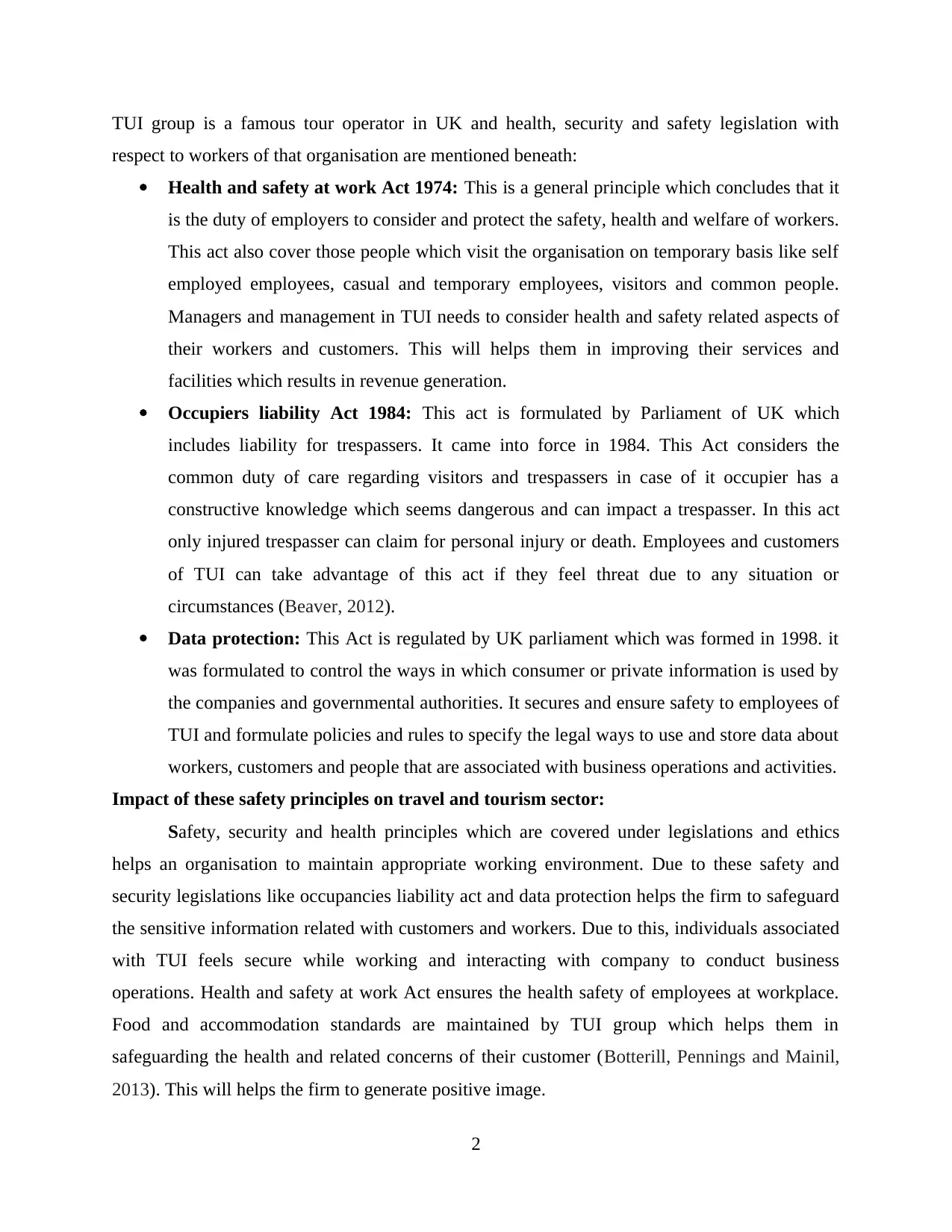
TUI group is a famous tour operator in UK and health, security and safety legislation with
respect to workers of that organisation are mentioned beneath:
Health and safety at work Act 1974: This is a general principle which concludes that it
is the duty of employers to consider and protect the safety, health and welfare of workers.
This act also cover those people which visit the organisation on temporary basis like self
employed employees, casual and temporary employees, visitors and common people.
Managers and management in TUI needs to consider health and safety related aspects of
their workers and customers. This will helps them in improving their services and
facilities which results in revenue generation.
Occupiers liability Act 1984: This act is formulated by Parliament of UK which
includes liability for trespassers. It came into force in 1984. This Act considers the
common duty of care regarding visitors and trespassers in case of it occupier has a
constructive knowledge which seems dangerous and can impact a trespasser. In this act
only injured trespasser can claim for personal injury or death. Employees and customers
of TUI can take advantage of this act if they feel threat due to any situation or
circumstances (Beaver, 2012).
Data protection: This Act is regulated by UK parliament which was formed in 1998. it
was formulated to control the ways in which consumer or private information is used by
the companies and governmental authorities. It secures and ensure safety to employees of
TUI and formulate policies and rules to specify the legal ways to use and store data about
workers, customers and people that are associated with business operations and activities.
Impact of these safety principles on travel and tourism sector:
Safety, security and health principles which are covered under legislations and ethics
helps an organisation to maintain appropriate working environment. Due to these safety and
security legislations like occupancies liability act and data protection helps the firm to safeguard
the sensitive information related with customers and workers. Due to this, individuals associated
with TUI feels secure while working and interacting with company to conduct business
operations. Health and safety at work Act ensures the health safety of employees at workplace.
Food and accommodation standards are maintained by TUI group which helps them in
safeguarding the health and related concerns of their customer (Botterill, Pennings and Mainil,
2013). This will helps the firm to generate positive image.
2
respect to workers of that organisation are mentioned beneath:
Health and safety at work Act 1974: This is a general principle which concludes that it
is the duty of employers to consider and protect the safety, health and welfare of workers.
This act also cover those people which visit the organisation on temporary basis like self
employed employees, casual and temporary employees, visitors and common people.
Managers and management in TUI needs to consider health and safety related aspects of
their workers and customers. This will helps them in improving their services and
facilities which results in revenue generation.
Occupiers liability Act 1984: This act is formulated by Parliament of UK which
includes liability for trespassers. It came into force in 1984. This Act considers the
common duty of care regarding visitors and trespassers in case of it occupier has a
constructive knowledge which seems dangerous and can impact a trespasser. In this act
only injured trespasser can claim for personal injury or death. Employees and customers
of TUI can take advantage of this act if they feel threat due to any situation or
circumstances (Beaver, 2012).
Data protection: This Act is regulated by UK parliament which was formed in 1998. it
was formulated to control the ways in which consumer or private information is used by
the companies and governmental authorities. It secures and ensure safety to employees of
TUI and formulate policies and rules to specify the legal ways to use and store data about
workers, customers and people that are associated with business operations and activities.
Impact of these safety principles on travel and tourism sector:
Safety, security and health principles which are covered under legislations and ethics
helps an organisation to maintain appropriate working environment. Due to these safety and
security legislations like occupancies liability act and data protection helps the firm to safeguard
the sensitive information related with customers and workers. Due to this, individuals associated
with TUI feels secure while working and interacting with company to conduct business
operations. Health and safety at work Act ensures the health safety of employees at workplace.
Food and accommodation standards are maintained by TUI group which helps them in
safeguarding the health and related concerns of their customer (Botterill, Pennings and Mainil,
2013). This will helps the firm to generate positive image.
2
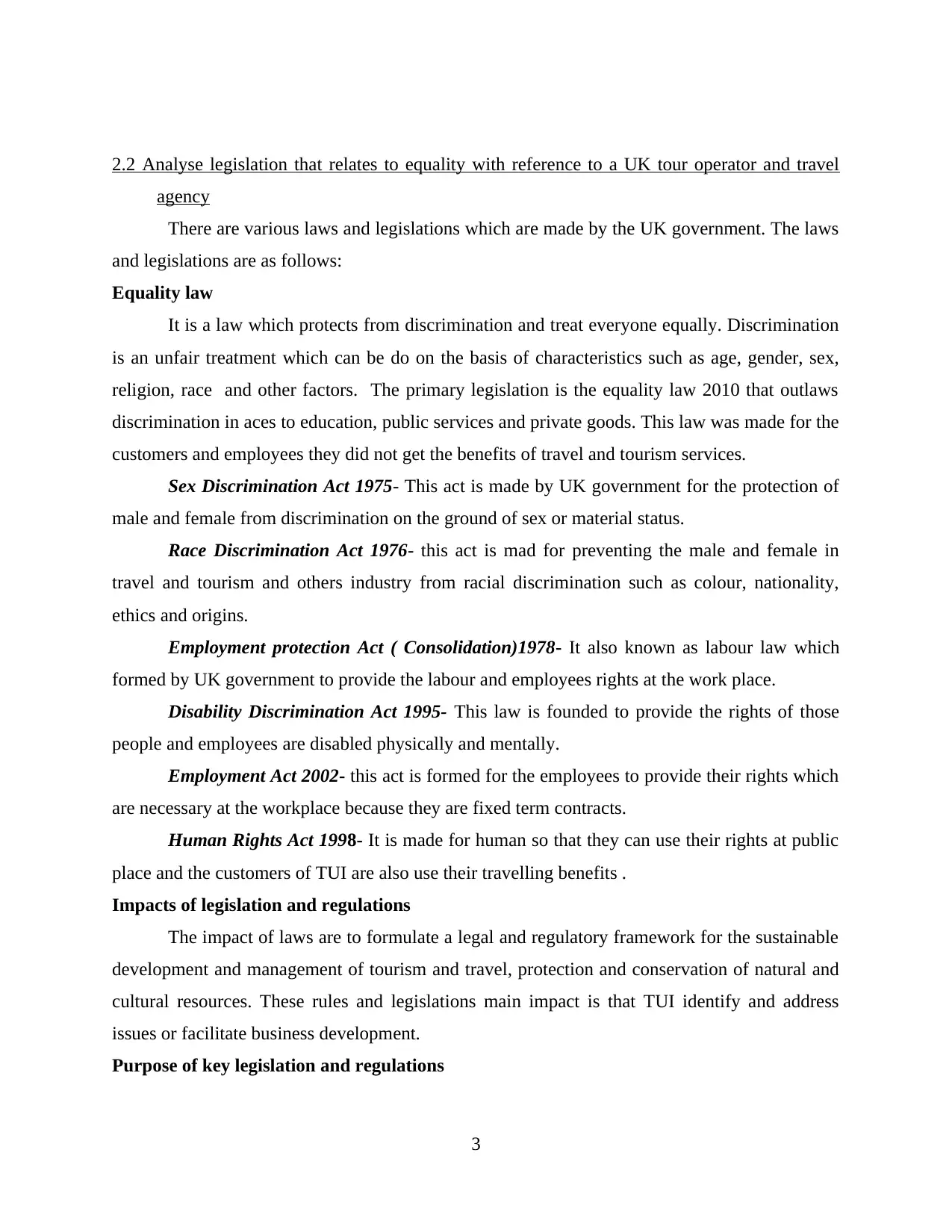
2.2 Analyse legislation that relates to equality with reference to a UK tour operator and travel
agency
There are various laws and legislations which are made by the UK government. The laws
and legislations are as follows:
Equality law
It is a law which protects from discrimination and treat everyone equally. Discrimination
is an unfair treatment which can be do on the basis of characteristics such as age, gender, sex,
religion, race and other factors. The primary legislation is the equality law 2010 that outlaws
discrimination in aces to education, public services and private goods. This law was made for the
customers and employees they did not get the benefits of travel and tourism services.
Sex Discrimination Act 1975- This act is made by UK government for the protection of
male and female from discrimination on the ground of sex or material status.
Race Discrimination Act 1976- this act is mad for preventing the male and female in
travel and tourism and others industry from racial discrimination such as colour, nationality,
ethics and origins.
Employment protection Act ( Consolidation)1978- It also known as labour law which
formed by UK government to provide the labour and employees rights at the work place.
Disability Discrimination Act 1995- This law is founded to provide the rights of those
people and employees are disabled physically and mentally.
Employment Act 2002- this act is formed for the employees to provide their rights which
are necessary at the workplace because they are fixed term contracts.
Human Rights Act 1998- It is made for human so that they can use their rights at public
place and the customers of TUI are also use their travelling benefits .
Impacts of legislation and regulations
The impact of laws are to formulate a legal and regulatory framework for the sustainable
development and management of tourism and travel, protection and conservation of natural and
cultural resources. These rules and legislations main impact is that TUI identify and address
issues or facilitate business development.
Purpose of key legislation and regulations
3
agency
There are various laws and legislations which are made by the UK government. The laws
and legislations are as follows:
Equality law
It is a law which protects from discrimination and treat everyone equally. Discrimination
is an unfair treatment which can be do on the basis of characteristics such as age, gender, sex,
religion, race and other factors. The primary legislation is the equality law 2010 that outlaws
discrimination in aces to education, public services and private goods. This law was made for the
customers and employees they did not get the benefits of travel and tourism services.
Sex Discrimination Act 1975- This act is made by UK government for the protection of
male and female from discrimination on the ground of sex or material status.
Race Discrimination Act 1976- this act is mad for preventing the male and female in
travel and tourism and others industry from racial discrimination such as colour, nationality,
ethics and origins.
Employment protection Act ( Consolidation)1978- It also known as labour law which
formed by UK government to provide the labour and employees rights at the work place.
Disability Discrimination Act 1995- This law is founded to provide the rights of those
people and employees are disabled physically and mentally.
Employment Act 2002- this act is formed for the employees to provide their rights which
are necessary at the workplace because they are fixed term contracts.
Human Rights Act 1998- It is made for human so that they can use their rights at public
place and the customers of TUI are also use their travelling benefits .
Impacts of legislation and regulations
The impact of laws are to formulate a legal and regulatory framework for the sustainable
development and management of tourism and travel, protection and conservation of natural and
cultural resources. These rules and legislations main impact is that TUI identify and address
issues or facilitate business development.
Purpose of key legislation and regulations
3
⊘ This is a preview!⊘
Do you want full access?
Subscribe today to unlock all pages.

Trusted by 1+ million students worldwide
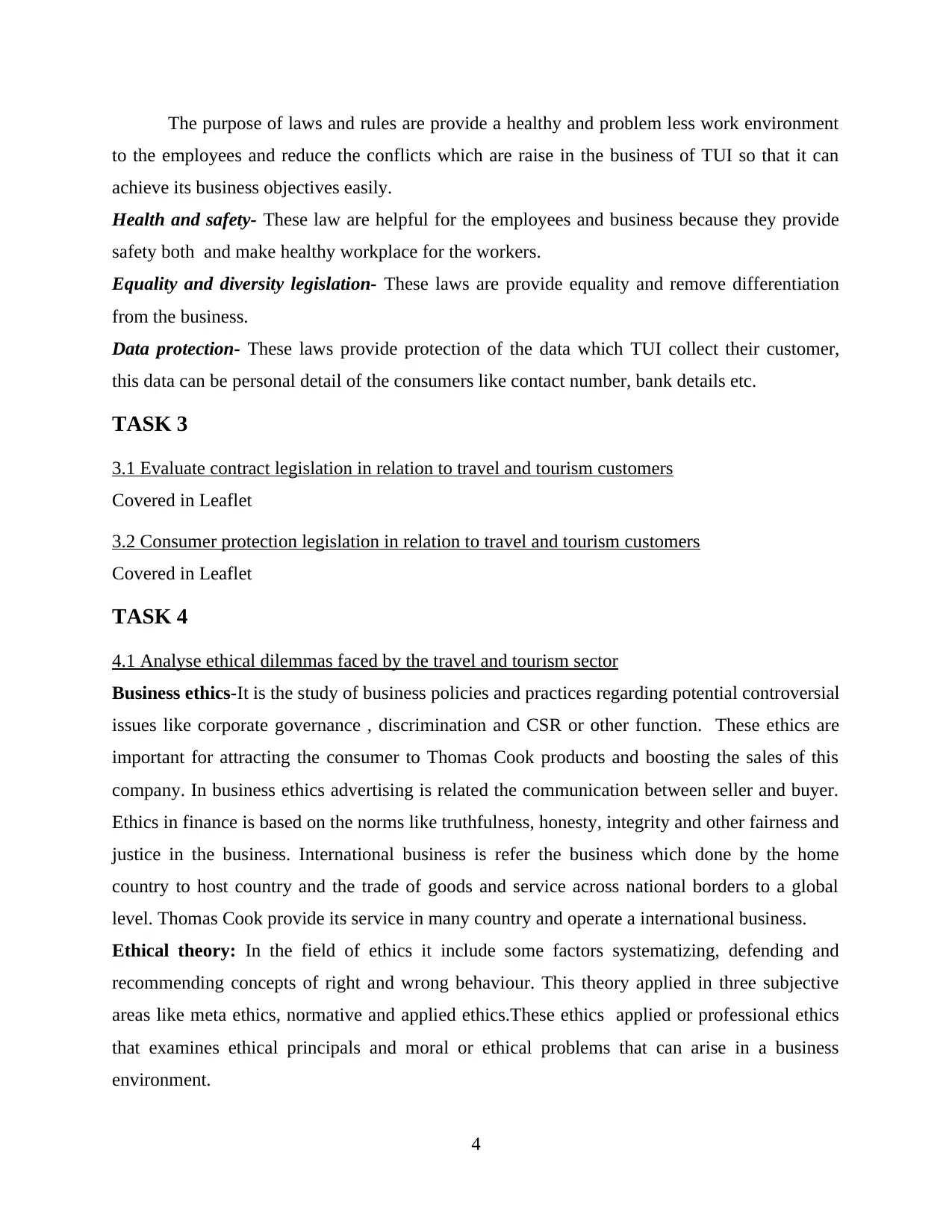
The purpose of laws and rules are provide a healthy and problem less work environment
to the employees and reduce the conflicts which are raise in the business of TUI so that it can
achieve its business objectives easily.
Health and safety- These law are helpful for the employees and business because they provide
safety both and make healthy workplace for the workers.
Equality and diversity legislation- These laws are provide equality and remove differentiation
from the business.
Data protection- These laws provide protection of the data which TUI collect their customer,
this data can be personal detail of the consumers like contact number, bank details etc.
TASK 3
3.1 Evaluate contract legislation in relation to travel and tourism customers
Covered in Leaflet
3.2 Consumer protection legislation in relation to travel and tourism customers
Covered in Leaflet
TASK 4
4.1 Analyse ethical dilemmas faced by the travel and tourism sector
Business ethics-It is the study of business policies and practices regarding potential controversial
issues like corporate governance , discrimination and CSR or other function. These ethics are
important for attracting the consumer to Thomas Cook products and boosting the sales of this
company. In business ethics advertising is related the communication between seller and buyer.
Ethics in finance is based on the norms like truthfulness, honesty, integrity and other fairness and
justice in the business. International business is refer the business which done by the home
country to host country and the trade of goods and service across national borders to a global
level. Thomas Cook provide its service in many country and operate a international business.
Ethical theory: In the field of ethics it include some factors systematizing, defending and
recommending concepts of right and wrong behaviour. This theory applied in three subjective
areas like meta ethics, normative and applied ethics.These ethics applied or professional ethics
that examines ethical principals and moral or ethical problems that can arise in a business
environment.
4
to the employees and reduce the conflicts which are raise in the business of TUI so that it can
achieve its business objectives easily.
Health and safety- These law are helpful for the employees and business because they provide
safety both and make healthy workplace for the workers.
Equality and diversity legislation- These laws are provide equality and remove differentiation
from the business.
Data protection- These laws provide protection of the data which TUI collect their customer,
this data can be personal detail of the consumers like contact number, bank details etc.
TASK 3
3.1 Evaluate contract legislation in relation to travel and tourism customers
Covered in Leaflet
3.2 Consumer protection legislation in relation to travel and tourism customers
Covered in Leaflet
TASK 4
4.1 Analyse ethical dilemmas faced by the travel and tourism sector
Business ethics-It is the study of business policies and practices regarding potential controversial
issues like corporate governance , discrimination and CSR or other function. These ethics are
important for attracting the consumer to Thomas Cook products and boosting the sales of this
company. In business ethics advertising is related the communication between seller and buyer.
Ethics in finance is based on the norms like truthfulness, honesty, integrity and other fairness and
justice in the business. International business is refer the business which done by the home
country to host country and the trade of goods and service across national borders to a global
level. Thomas Cook provide its service in many country and operate a international business.
Ethical theory: In the field of ethics it include some factors systematizing, defending and
recommending concepts of right and wrong behaviour. This theory applied in three subjective
areas like meta ethics, normative and applied ethics.These ethics applied or professional ethics
that examines ethical principals and moral or ethical problems that can arise in a business
environment.
4
Paraphrase This Document
Need a fresh take? Get an instant paraphrase of this document with our AI Paraphraser
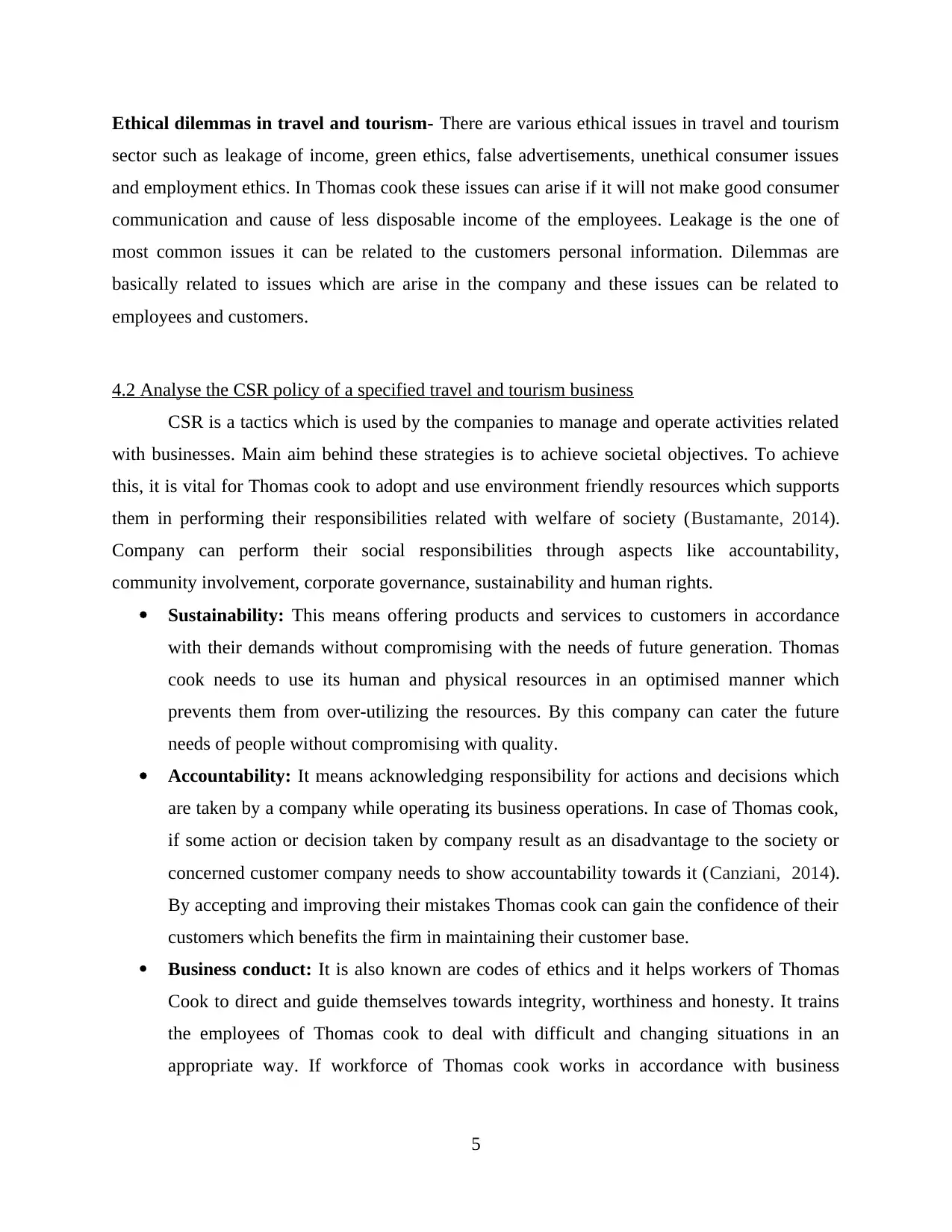
Ethical dilemmas in travel and tourism- There are various ethical issues in travel and tourism
sector such as leakage of income, green ethics, false advertisements, unethical consumer issues
and employment ethics. In Thomas cook these issues can arise if it will not make good consumer
communication and cause of less disposable income of the employees. Leakage is the one of
most common issues it can be related to the customers personal information. Dilemmas are
basically related to issues which are arise in the company and these issues can be related to
employees and customers.
4.2 Analyse the CSR policy of a specified travel and tourism business
CSR is a tactics which is used by the companies to manage and operate activities related
with businesses. Main aim behind these strategies is to achieve societal objectives. To achieve
this, it is vital for Thomas cook to adopt and use environment friendly resources which supports
them in performing their responsibilities related with welfare of society (Bustamante, 2014).
Company can perform their social responsibilities through aspects like accountability,
community involvement, corporate governance, sustainability and human rights.
Sustainability: This means offering products and services to customers in accordance
with their demands without compromising with the needs of future generation. Thomas
cook needs to use its human and physical resources in an optimised manner which
prevents them from over-utilizing the resources. By this company can cater the future
needs of people without compromising with quality.
Accountability: It means acknowledging responsibility for actions and decisions which
are taken by a company while operating its business operations. In case of Thomas cook,
if some action or decision taken by company result as an disadvantage to the society or
concerned customer company needs to show accountability towards it (Canziani, 2014).
By accepting and improving their mistakes Thomas cook can gain the confidence of their
customers which benefits the firm in maintaining their customer base.
Business conduct: It is also known are codes of ethics and it helps workers of Thomas
Cook to direct and guide themselves towards integrity, worthiness and honesty. It trains
the employees of Thomas cook to deal with difficult and changing situations in an
appropriate way. If workforce of Thomas cook works in accordance with business
5
sector such as leakage of income, green ethics, false advertisements, unethical consumer issues
and employment ethics. In Thomas cook these issues can arise if it will not make good consumer
communication and cause of less disposable income of the employees. Leakage is the one of
most common issues it can be related to the customers personal information. Dilemmas are
basically related to issues which are arise in the company and these issues can be related to
employees and customers.
4.2 Analyse the CSR policy of a specified travel and tourism business
CSR is a tactics which is used by the companies to manage and operate activities related
with businesses. Main aim behind these strategies is to achieve societal objectives. To achieve
this, it is vital for Thomas cook to adopt and use environment friendly resources which supports
them in performing their responsibilities related with welfare of society (Bustamante, 2014).
Company can perform their social responsibilities through aspects like accountability,
community involvement, corporate governance, sustainability and human rights.
Sustainability: This means offering products and services to customers in accordance
with their demands without compromising with the needs of future generation. Thomas
cook needs to use its human and physical resources in an optimised manner which
prevents them from over-utilizing the resources. By this company can cater the future
needs of people without compromising with quality.
Accountability: It means acknowledging responsibility for actions and decisions which
are taken by a company while operating its business operations. In case of Thomas cook,
if some action or decision taken by company result as an disadvantage to the society or
concerned customer company needs to show accountability towards it (Canziani, 2014).
By accepting and improving their mistakes Thomas cook can gain the confidence of their
customers which benefits the firm in maintaining their customer base.
Business conduct: It is also known are codes of ethics and it helps workers of Thomas
Cook to direct and guide themselves towards integrity, worthiness and honesty. It trains
the employees of Thomas cook to deal with difficult and changing situations in an
appropriate way. If workforce of Thomas cook works in accordance with business
5
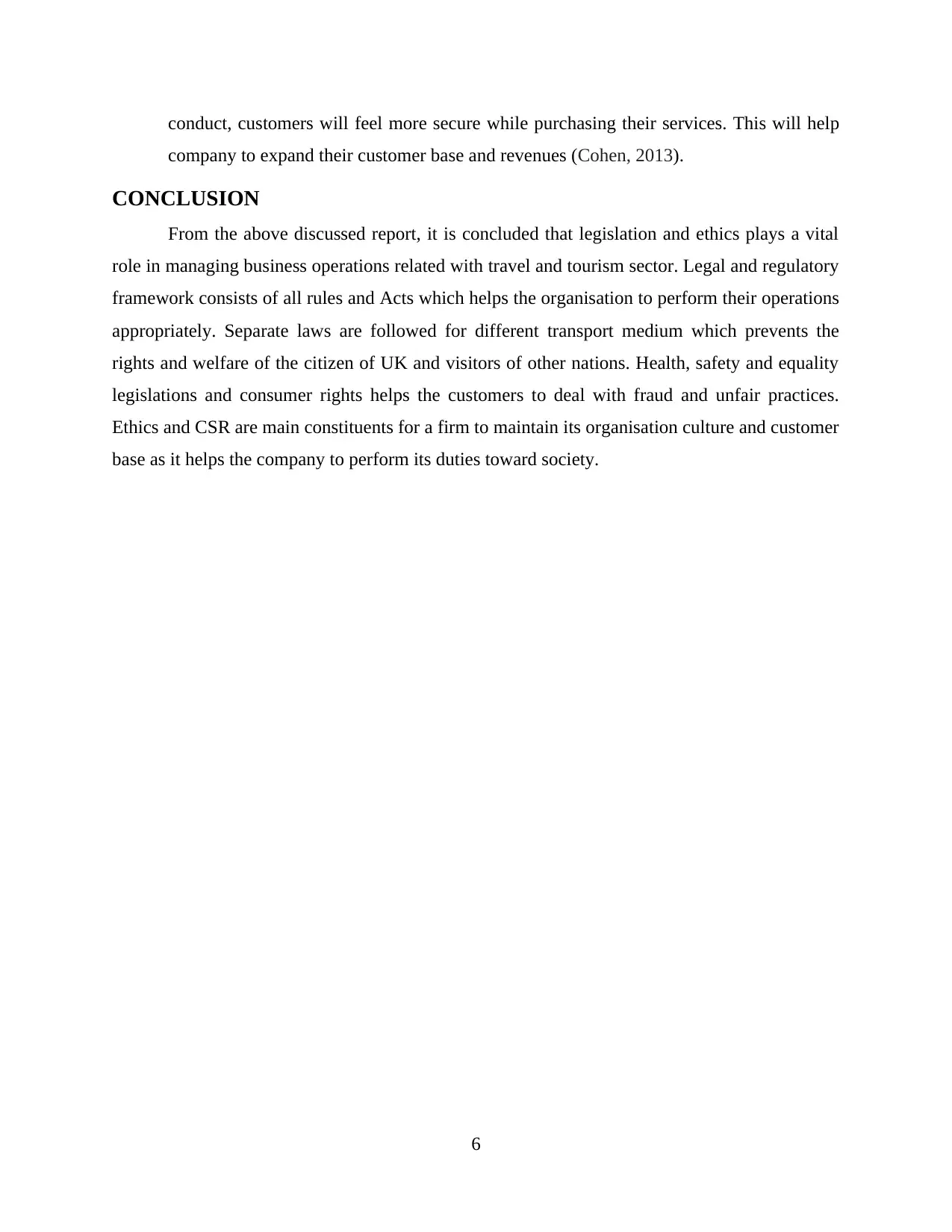
conduct, customers will feel more secure while purchasing their services. This will help
company to expand their customer base and revenues (Cohen, 2013).
CONCLUSION
From the above discussed report, it is concluded that legislation and ethics plays a vital
role in managing business operations related with travel and tourism sector. Legal and regulatory
framework consists of all rules and Acts which helps the organisation to perform their operations
appropriately. Separate laws are followed for different transport medium which prevents the
rights and welfare of the citizen of UK and visitors of other nations. Health, safety and equality
legislations and consumer rights helps the customers to deal with fraud and unfair practices.
Ethics and CSR are main constituents for a firm to maintain its organisation culture and customer
base as it helps the company to perform its duties toward society.
6
company to expand their customer base and revenues (Cohen, 2013).
CONCLUSION
From the above discussed report, it is concluded that legislation and ethics plays a vital
role in managing business operations related with travel and tourism sector. Legal and regulatory
framework consists of all rules and Acts which helps the organisation to perform their operations
appropriately. Separate laws are followed for different transport medium which prevents the
rights and welfare of the citizen of UK and visitors of other nations. Health, safety and equality
legislations and consumer rights helps the customers to deal with fraud and unfair practices.
Ethics and CSR are main constituents for a firm to maintain its organisation culture and customer
base as it helps the company to perform its duties toward society.
6
⊘ This is a preview!⊘
Do you want full access?
Subscribe today to unlock all pages.

Trusted by 1+ million students worldwide
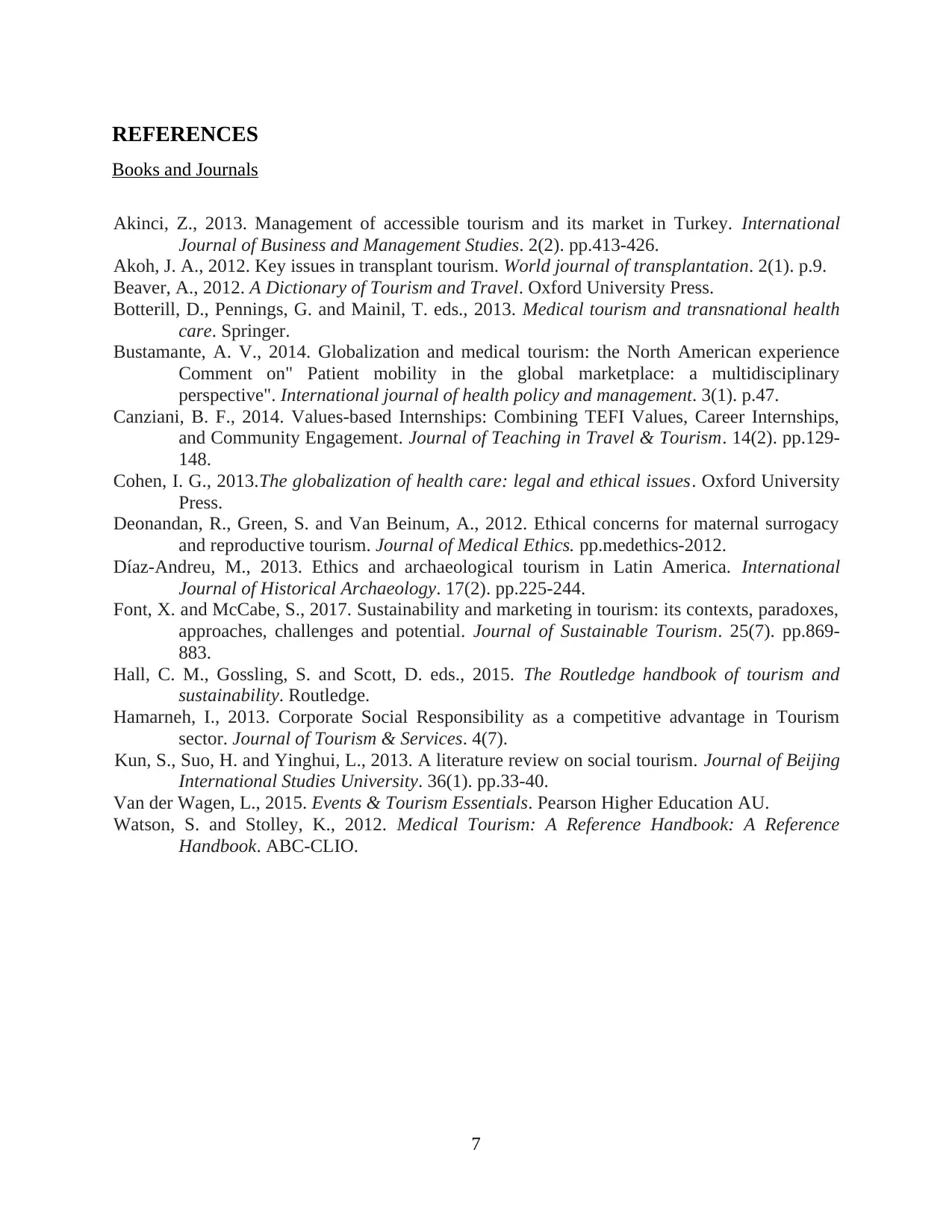
REFERENCES
Books and Journals
Akinci, Z., 2013. Management of accessible tourism and its market in Turkey. International
Journal of Business and Management Studies. 2(2). pp.413-426.
Akoh, J. A., 2012. Key issues in transplant tourism. World journal of transplantation. 2(1). p.9.
Beaver, A., 2012. A Dictionary of Tourism and Travel. Oxford University Press.
Botterill, D., Pennings, G. and Mainil, T. eds., 2013. Medical tourism and transnational health
care. Springer.
Bustamante, A. V., 2014. Globalization and medical tourism: the North American experience
Comment on" Patient mobility in the global marketplace: a multidisciplinary
perspective". International journal of health policy and management. 3(1). p.47.
Canziani, B. F., 2014. Values-based Internships: Combining TEFI Values, Career Internships,
and Community Engagement. Journal of Teaching in Travel & Tourism. 14(2). pp.129-
148.
Cohen, I. G., 2013.The globalization of health care: legal and ethical issues. Oxford University
Press.
Deonandan, R., Green, S. and Van Beinum, A., 2012. Ethical concerns for maternal surrogacy
and reproductive tourism. Journal of Medical Ethics. pp.medethics-2012.
Díaz-Andreu, M., 2013. Ethics and archaeological tourism in Latin America. International
Journal of Historical Archaeology. 17(2). pp.225-244.
Font, X. and McCabe, S., 2017. Sustainability and marketing in tourism: its contexts, paradoxes,
approaches, challenges and potential. Journal of Sustainable Tourism. 25(7). pp.869-
883.
Hall, C. M., Gossling, S. and Scott, D. eds., 2015. The Routledge handbook of tourism and
sustainability. Routledge.
Hamarneh, I., 2013. Corporate Social Responsibility as a competitive advantage in Tourism
sector. Journal of Tourism & Services. 4(7).
Kun, S., Suo, H. and Yinghui, L., 2013. A literature review on social tourism. Journal of Beijing
International Studies University. 36(1). pp.33-40.
Van der Wagen, L., 2015. Events & Tourism Essentials. Pearson Higher Education AU.
Watson, S. and Stolley, K., 2012. Medical Tourism: A Reference Handbook: A Reference
Handbook. ABC-CLIO.
7
Books and Journals
Akinci, Z., 2013. Management of accessible tourism and its market in Turkey. International
Journal of Business and Management Studies. 2(2). pp.413-426.
Akoh, J. A., 2012. Key issues in transplant tourism. World journal of transplantation. 2(1). p.9.
Beaver, A., 2012. A Dictionary of Tourism and Travel. Oxford University Press.
Botterill, D., Pennings, G. and Mainil, T. eds., 2013. Medical tourism and transnational health
care. Springer.
Bustamante, A. V., 2014. Globalization and medical tourism: the North American experience
Comment on" Patient mobility in the global marketplace: a multidisciplinary
perspective". International journal of health policy and management. 3(1). p.47.
Canziani, B. F., 2014. Values-based Internships: Combining TEFI Values, Career Internships,
and Community Engagement. Journal of Teaching in Travel & Tourism. 14(2). pp.129-
148.
Cohen, I. G., 2013.The globalization of health care: legal and ethical issues. Oxford University
Press.
Deonandan, R., Green, S. and Van Beinum, A., 2012. Ethical concerns for maternal surrogacy
and reproductive tourism. Journal of Medical Ethics. pp.medethics-2012.
Díaz-Andreu, M., 2013. Ethics and archaeological tourism in Latin America. International
Journal of Historical Archaeology. 17(2). pp.225-244.
Font, X. and McCabe, S., 2017. Sustainability and marketing in tourism: its contexts, paradoxes,
approaches, challenges and potential. Journal of Sustainable Tourism. 25(7). pp.869-
883.
Hall, C. M., Gossling, S. and Scott, D. eds., 2015. The Routledge handbook of tourism and
sustainability. Routledge.
Hamarneh, I., 2013. Corporate Social Responsibility as a competitive advantage in Tourism
sector. Journal of Tourism & Services. 4(7).
Kun, S., Suo, H. and Yinghui, L., 2013. A literature review on social tourism. Journal of Beijing
International Studies University. 36(1). pp.33-40.
Van der Wagen, L., 2015. Events & Tourism Essentials. Pearson Higher Education AU.
Watson, S. and Stolley, K., 2012. Medical Tourism: A Reference Handbook: A Reference
Handbook. ABC-CLIO.
7
1 out of 10
Related Documents
Your All-in-One AI-Powered Toolkit for Academic Success.
+13062052269
info@desklib.com
Available 24*7 on WhatsApp / Email
![[object Object]](/_next/static/media/star-bottom.7253800d.svg)
Unlock your academic potential
Copyright © 2020–2026 A2Z Services. All Rights Reserved. Developed and managed by ZUCOL.




